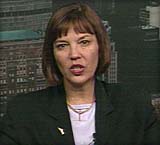Judith Miller
From dKosopedia
Categories: Media figures | Plame leak scandal
Biography
Judith Miller is an author and Pulitzer Prize-winning correspondent at The New York Times who writes about national security issues, with special emphasis on terrorism, the Middle East and weapons of mass destruction.
In 1977 she joined the paper’s Washington Bureau, where she covered the securities industry, Congress, politics, foreign affairs, particularly the Middle East and nuclear proliferation issues. In 1983, she became the first woman to be named chief of The Times' bureau in Cairo, Egypt, responsible for covering the Arab world. In 1986, she became the correspondent in Paris, traveling throughout Europe and North Africa. In 1987 and 1988, she returned to Washington as the Washington Bureau's news editor and deputy bureau chief.
She said she speaks some Arabic, but after 25 years that obviously wasn't enough because she needed a translator for every Middle East story she covered, whose accuracy or reliability she had no way of assessing. Her seriousness as a reporter of Middle Eastern affairs is in question as she doesn't know the requisite languages. She said on numerous occasions she has no knowledge of either Arabic or Persian. She only cites things she knows in English, either limiting her to people whose views match hers or she knows what she wants. It also means whole libraries are closed off to her.
Even the little Arabic she quotes in her articles and books she gets wrong. Her errors aren't scholarly mistakes, but simple, common basic arabic phrases. After 25 years of earning a living concerning the middle east, the least she could do is learn the language. On page 211 of her book she quotes Sadat's description of Qadaffi as 'al walid majnoon' and translates it "that crazy boy." The accent and even the basic grammer is incorrect; It should be something more like "el walad el magnoon" because otherwise she's saying "the boy is crazy," in a different accent no less. She's lousy in many other examples, like Shadia, the popular Egyptian actress, is written by her as Sha'adia, showing that Miller doesn't even know the difference between letters of the Arabic alphabet; alif and 'ayn.
In May, 1989, she became co-coordinator of a newly created unit to enhance the paper’s coverage of radio, television, advertising, and publishing. In October, 1990, she was named special correspondent to the Persian Gulf crisis, and after that, The Times' Sunday Magazine's special correspondent.
Before joining The Times, Ms. Miller was Washington bureau chief of The Progressive, a monthly, was a regular contributor to National Public Radio, and wrote articles for publications.
Born in New York City, Ms. Miller grew up in Miami and Los Angeles, where she graduated from Hollywood High School. She attended Ohio State University, Barnard College and the Institute of European Studies at the University of Brussels. She has a bachelor's degree from Barnard and a masters from Princeton University's Woodrow Wilson School of Public and International Affairs.
Ms. Miller has written four books and contributed chapters to several others. Her most recent book is “Germs: Biological Weapons and America’s Secret War.” (Simon & Schuster) Written with two colleagues from The Times, the book topped the best seller‘s list. Her previous book, God Has Ninety-Nine Names: A Reporter's Journey Through a Militant Middle East, also published by Simon & Schuster in 1996, explores the spread of Islamic extremism in ten Middle Eastern countries, but was criticized for reserving her criticism of Israel. She is also the author of One, By One, By One, a highly praised account of how people in six nations have distorted the memory of the Holocaust, also published by Simon & Schuster in 1990. In 1990, she co-authored Saddam Hussein and the Crisis in the Gulf, the first comprehensive account of the Gulf crisis and biography of the man behind it. That, too, was a best seller which topped The Times Best Seller list during the 1991 Gulf war.
Judith Miller was part of a small team that won the Pulitzer Prize for “explanatory journalism” for her 2001 series on Osama bin Laden and Al Qaeda. In September, 2002, she won an Emmy for her work on a Nova/New York Times documentary based on articles for her book, “Germs.” She was also part of the Times team that won the prestigious DuPont award in 2002 for a series of tv programs on terrorism for Frontline.
Miller spent 85 days in jail for refusing to name the White Hourse sources implicated in the outing of a CIA agent. A prestigious journalistic group reversed its earlier decision to give Miller an award.
Daily Kos Diaries on the Topic of Judith Miller
General analysis of Miller's career
Judith Miller: 3 Decades of Disinformation
Judith Miller's Sources: The Usual Suspects
Miller Won't Get 'Conscience in Media' Award
DKos writer emptywheel describes Miller's hijinks, lies, and shenanigans as an embedded Iraq War journalist
What Judy Miller Did as an Embed in Iraq, Part One
What Judy Miller Did as an Embed in Iraq, Part Two
What Judy Miller Did as an Embed in Iraq, Part Three
What Judy Miller Did as an Embed in Iraq, Part Four
What Judy Miller Did as an Embed in Iraq, Part Five
What Judy Miller Did as an Embed, Conclusion
What Ahmed Chalabi Did While Judy Was Embedded
Miller's involvement in federal investigation of the WH outing of a covert CIA operative
Plamegate News: Is Times protection of Miller collapsing?
Judith Miller and the Reporter's Privilege
Did Scooter Libby Release Judith Miller From Her Confidentiality Pledge?
Joe Wilson on Sentencing of Judith Miller

![[Main Page]](../../../../upload/banner-blue-135.jpg)